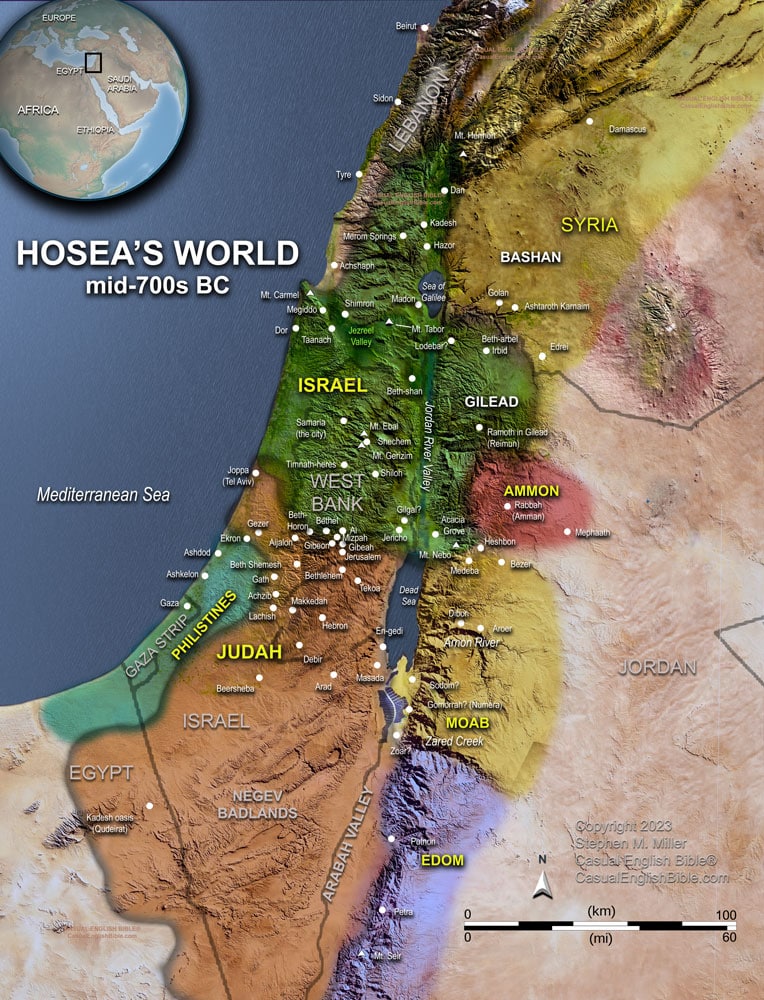Hosea 10
Scenes from Israel’s future fall
Israel is plucked
1Israel is like a loaded vine, picked clean. [1]The bigger the grape harvest,
The more pagan altars they built.
And the stronger the economy,
The more pillars they added to shrines.
2Their hearts were dead wrong.
Now their guilt will bury them.
The LORD himself will destroy their altars.
He’ll tear down the pillars and smash them.
The king is gone
3Then they’ll say, “We don’t have a kingBecause we didn’t respect God.
But what could a king do for us anyhow?”
4They lie, make promises they won’t keep,
And break their contracts.
So, injustice grows like poisonous weeds
Along the plowed rows in a garden.
5Samaria’s people tremble in fear
Over the loss of Beth-aven’s [2] calf idol.
Worshipers will mourn it.
Priests will weep and wail.
6This gold-dipped idol is leaving,
Headed to Assyria—a gift to the king.
Ephraim [3] will become disgraced,
Ashamed of its idol.
7Samaria will fall,
The king will die.
They’ll both disappear
Like twigs in a river.
8Israel’s shrines are tagged for destruction
On the hilltops where Israel sinned.
Briars and bramble will bury their altars
That beg the mountains, “Hide us!”
And the hills, “Bury us under your rocks!”
God is coming for evil Israel
9My goodness, Israel,You’ve been sinning
Since the day you sinned in Gibeah. [4]
For the evil they did and still do,
War will crush them, as it did before.
10I’m coming to punish my misguided people.
Nations will unite against them.
And Israel will pay
For a long list of sins.
11Ephraim was a cow trained for the light job
Of threshing [5] grain at harvest.
But now she’ll plow the hard-packed ground.
Then Judah will plow what you’ve turned. [6]
12Now plant a crop of goodness. Be kind.
Then harvest a crop of loyalty from others.
Plow into the fields of knowledge
And wait for the showers of justice.
Trust your army, you get your war
13You plowed the dirt and planted evil.Then you harvested injustice
And fed on the lies.
You put your faith in weapons of war,
Your chariots and your massive army.
14Well, war it will be.
And it’s coming to you.
Walls of your cities will fall.
King Shalman [7] destroyed Beth-arbel, [8]
Where he bashed into pieces
Mothers and babies.
15This is what’s coming to you, poor Bethel,
Because of the evil you’ve done.
When the dawn breaks over Israel
The lights go will go out for your king.
Footnotes
The original Hebrew text is hard to interpret. That explains why some translations say the vine is “luxuriant” (New Revised Standard Version Updated Edition) and others say it is “ravaged” (Jewish Study Bible, Tanakh Translation) and empty. Some scholars say Hosea may have intended both and wrote it as a double-entendre. For example, it is both barren and productive because through its behavior, it produced barrenness. Luxuriantly ravaged?
Beth-aven was a sarcastic, slap in the face nickname for Bethel. A little like Filthadelphia for Philadelphia or Liverpuddle for Liverpool. “Bethel” translates as beth = house, and el = god. House of God. “Beth-aven” is the opposite of the joy that comes with having God in the house. It means House of Trouble. Bethel was the main worship center in Israel (1 Kings 12:28-30).
“Ephraim” is another name for the Northern Jewish nation of Israel. It was the dominate tribe, and the last to fall to Assyrian encroachment. The first northern king came from Ephraim. It’s a tribe located at the center of what had been the united nation of Israel before the split. Ephraim’s southern border was just half a day’s walk north of Jerusalem.
Israelites in Gibeah gang-raped and murdered a Levite’s concubine. Attempts to arrest the criminals ended in a civil war that nearly annihilated the tribe of Benjamin (Judges, chapters 19-21).
Threshing is what farmers do to separate grain kernels from stalks. They used animals to pull heavy sleds over the stalks, to break the kernels loose.
This may be a poet’s way of talking about the fall of Israel and the exile that followed and then a repeat of that, but for Judah. Life is easy—like the light duty of threshing. But life is going to become a tough row to hoe. Pulling a plow through the hard and rocky soil in the region is grueling work. The second plowing of the ground turned over once is usually easier than the first plowing. The first plowing may represent Assyria defeating the northern Jewish nation of Israel in 722 BC. Second plowing: Babylonians defeated the southern Jews of Judah in 586 BC.
It’s unclear who Shalman was and when this battle took place. One guess is that the king was Assyria’s Shalmaneser, who ruled from 727-722 BC. He invaded Israel during the reign of Jehu, and perhaps fought this unreported battle on his way to Samaria. Another guess is the invader was a Moabite king named Salmanu, who shows up in a list of kings paying taxes to Tiglath-Pileser III, who ruled before Shalmaneser, from 745-727 BC.
Beth-arbel is often linked to Irbid, a city also known as Arbela. It’s east of the Jordan River. Go south of the Sea of Galilee about 10 miles (16 km), then hang a hard left, turning east. Walk 15 miles (24 km) into the country of Jordan.
Discussion Questions
- Sorry, there are currently no questions for this chapter.









